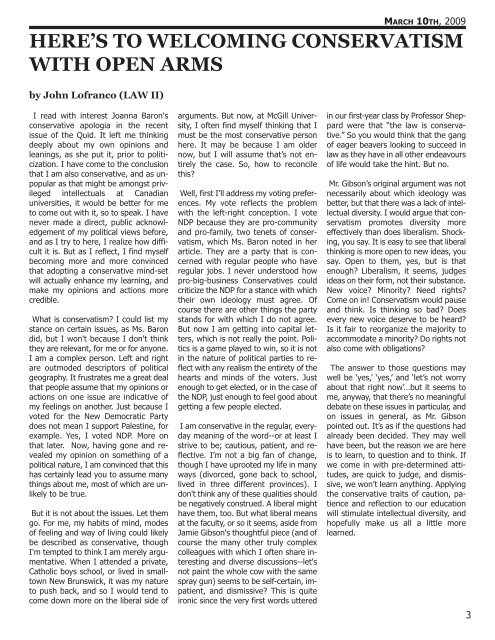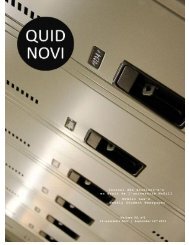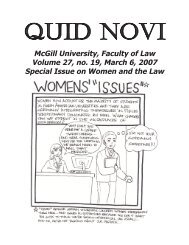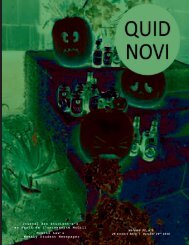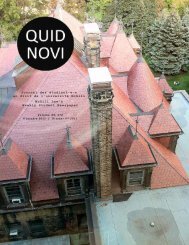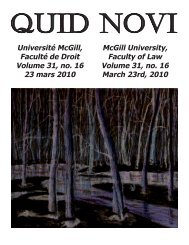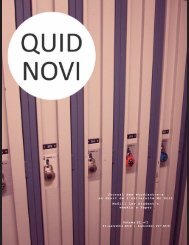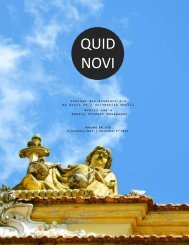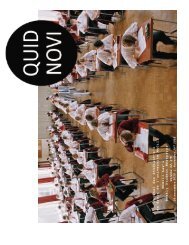Quid Template
Quid Template
Quid Template
- No tags were found...
Create successful ePaper yourself
Turn your PDF publications into a flip-book with our unique Google optimized e-Paper software.
MARCH 10TH, 2009HERE’S TO WELCOMING CONSERVATISMWITH OPEN ARMSby John Lofranco (LAW II)I read with interest Joanna Baron'sconservative apologia in the recentissue of the <strong>Quid</strong>. It left me thinkingdeeply about my own opinions andleanings, as she put it, prior to politicization.I have come to the conclusionthat I am also conservative, and as unpopularas that might be amongst privilegedintellectuals at Canadianuniversities, it would be better for meto come out with it, so to speak. I havenever made a direct, public acknowledgementof my political views before,and as I try to here, I realize how difficultit is. But as I reflect, I find myselfbecoming more and more convincedthat adopting a conservative mind-setwill actually enhance my learning, andmake my opinions and actions morecredible.What is conservatism? I could list mystance on certain issues, as Ms. Barondid, but I won't because I don't thinkthey are relevant, for me or for anyone.I am a complex person. Left and rightare outmoded descriptors of politicalgeography. It frustrates me a great dealthat people assume that my opinions oractions on one issue are indicative ofmy feelings on another. Just because Ivoted for the New Democratic Partydoes not mean I support Palestine, forexample. Yes, I voted NDP. More onthat later. Now, having gone and revealedmy opinion on something of apolitical nature, I am convinced that thishas certainly lead you to assume manythings about me, most of which are unlikelyto be true.But it is not about the issues. Let themgo. For me, my habits of mind, modesof feeling and way of living could likelybe described as conservative, thoughI'm tempted to think I am merely argumentative.When I attended a private,Catholic boys school, or lived in smalltownNew Brunswick, it was my natureto push back, and so I would tend tocome down more on the liberal side ofarguments. But now, at McGill University,I often find myself thinking that Imust be the most conservative personhere. It may be because I am oldernow, but I will assume that’s not entirelythe case. So, how to reconcilethis?Well, first I’ll address my voting preferences.My vote reflects the problemwith the left-right conception. I voteNDP because they are pro-communityand pro-family, two tenets of conservatism,which Ms. Baron noted in herarticle. They are a party that is concernedwith regular people who haveregular jobs. I never understood howpro-big-business Conservatives couldcriticize the NDP for a stance with whichtheir own ideology must agree. Ofcourse there are other things the partystands for with which I do not agree.But now I am getting into capital letters,which is not really the point. Politicsis a game played to win, so it is notin the nature of political parties to reflectwith any realism the entirety of thehearts and minds of the voters. Justenough to get elected, or in the case ofthe NDP, just enough to feel good aboutgetting a few people elected.I am conservative in the regular, everydaymeaning of the word--or at least Istrive to be; cautious, patient, and reflective.I’m not a big fan of change,though I have uprooted my life in manyways (divorced, gone back to school,lived in three different provinces). Idon't think any of these qualities shouldbe negatively construed. A liberal mighthave them, too. But what liberal meansat the faculty, or so it seems, aside fromJamie Gibson's thoughtful piece (and ofcourse the many other truly complexcolleagues with which I often share interestingand diverse discussions--let'snot paint the whole cow with the samespray gun) seems to be self-certain, impatient,and dismissive? This is quiteironic since the very first words utteredin our first-year class by Professor Sheppardwere that “the law is conservative.”So you would think that the gangof eager beavers looking to succeed inlaw as they have in all other endeavoursof life would take the hint. But no.Mr. Gibson’s original argument was notnecessarily about which ideology wasbetter, but that there was a lack of intellectualdiversity. I would argue that conservatismpromotes diversity moreeffectively than does liberalism. Shocking,you say. It is easy to see that liberalthinking is more open to new ideas, yousay. Open to them, yes, but is thatenough? Liberalism, it seems, judgesideas on their form, not their substance.New voice? Minority? Need rights?Come on in! Conservatism would pauseand think. Is thinking so bad? Doesevery new voice deserve to be heard?Is it fair to reorganize the majority toaccommodate a minority? Do rights notalso come with obligations?The answer to those questions maywell be ‘yes,’ ‘yes,’ and ‘let’s not worryabout that right now’…but it seems tome, anyway, that there’s no meaningfuldebate on these issues in particular, andon issues in general, as Mr. Gibsonpointed out. It’s as if the questions hadalready been decided. They may wellhave been, but the reason we are hereis to learn, to question and to think. Ifwe come in with pre-determined attitudes,are quick to judge, and dismissive,we won’t learn anything. Applyingthe conservative traits of caution, patienceand reflection to our educationwill stimulate intellectual diversity, andhopefully make us all a little morelearned.3


